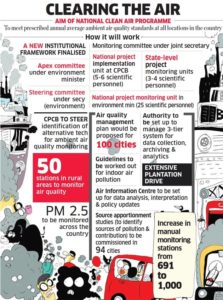Travel Tips
Lorem ipsum dolor sit amet, consectetur adipiscing elit.

National Clean Air Programme (NCAP)
What is the News?
 The government has launched National Clean Air Programme, a time-bound national level strategy to tackle increasing air pollution. This is the first ever effort in the country to frame a national framework for air quality management with a time-bound reduction target.
The government has launched National Clean Air Programme, a time-bound national level strategy to tackle increasing air pollution. This is the first ever effort in the country to frame a national framework for air quality management with a time-bound reduction target.
The NCAP will be a mid-term, five-year action plan with 2019 as the first year. The main aim of the programme would be 20-30% reduction of PM2.5 and PM10 concentration by 2024.
What is the NCAP?
The National Clean Air Programme is a pollution control initiative that was launched by the Ministry of Environment with the intention to cut the concentration of coarse (particulate matter of diameter 10 micrometer or less, or PM10) and fine particles by at least 20% in the next five years, with 2017 as the base year for comparison.
Which cities will fall under this?
Following reports by WHO and the air quality data obtained, 102 cities from 23 States and UTs have been chosen as non-attainment cities.
With the exception of Delhi, Mumbai, Kolkata and Bengaluru, most of those chosen are tier two cities.
Who all will collaborate?
Apart from experts from the industry and academia, the programme is expected to be a collaboration between the Ministry of Road Transport and Highways, Ministry of Petroleum and Natural Gas, Ministry of New and Renewable Energy, Ministry of Heavy Industry, Ministry of Housing and Urban Affairs, Ministry of Agriculture, Ministry of Health, NITI Aayog, and Central Pollution Control Board.
Key features of NCAP